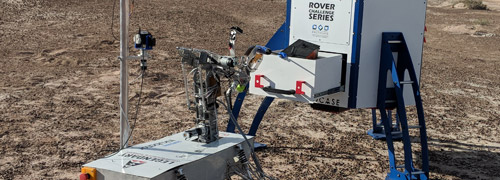In the complex, stringent medical device industry, the successful prototyping of new devices can greatly depend on the speed at which functioning models can be designed and produced. VECTTOR is a medical device designed by Dr. Donald Rhodes, a podiatrist based in Corpus Christi, Texas. This device was designed to help patients dealing with pain resulting from a wide variety of illnesses and conditions of which chronic pain is a symptom, including Type 1 Diabetes, Type 2 Diabetes, Parkinson's disease, Sickle-Cell disease, and Complex Regional Pain Syndrome.
How VECTTOR works
VECTTOR uses electro-stimulation based upon acupuncture, cellular physiology, and anatomy. It is designed to stimulate the nerves to produce certain neuropeptides, with the goal of increasing circulation to the skin, bones, nerves, and muscles, as well as reducing oxidative stress. "It is the first treatment that actually uses the patient's autonomic nervous system to choose the treatment," explains Dr. Rhodes. "This is done by sending electrical signals to certain acupuncture points to ask the body to send reinforcements to the required areas."
The VECTTOR system is also designed to read feedback from the body via skin surface temperature by constantly monitoring the temperature and looking for an indication of an increase in circulation.
Contribution from Protocase
The device was approved by the United States Food and Drug Administration (FDA) to treat chronic pain in 2012, and then by the Saudi Arabian FDA in May of 2018 for use in a clinical setting. However, in order for the device to comply with legal regulations for hospital and physician use in Saudi Arabia, Dr. Rhodes needed to develop what he calls a "physician's model." This model is a more durable and professional version of the device, which allows it to be operated on table-top surfaces, as opposed to it being a hand-held system. Besides maintaining regulatory compliances, the new version of VECTTOR gave the device more flexibility to be moved around and provided additional resistance to damage.
Ron Graczyk, an engineer and owner of 3SPLabs Company in Cedar Park, Texas, volunteered his time to assist Dr. Rhodes by designing electronic enclosures to house the VECTTOR system. Dr. Rhodes' contractor originally introduced him to Graczyk, because he was looking for an engineer to help move the device through the development process. The custom designs Graczyk created would eventually be ordered and manufactured using Protocase's services.
Using Solidworks, he designed a 20-gage Cold Rolled Steel enclosure, along with custom left and right brackets. The enclosure was built in a U-shape style with internal supports added. "I tried to minimize the number of fasteners and complexity of the design, while also keeping the cable attachment process in mind," explains Graczyk.
Since Graczyk had previously used Protocase for custom manufacturing in his professional career, he knew it was a logical choice for this volunteer engineering work. "I expected the product to be of reasonable price, and have a professional fit and finish with no hassle," says Graczyk. "All expectations were met. With Protocase as our supplier, we got it right the first time."
The end result, says Dr. Rhodes, was an enclosure that made the system much sturdier and more sophisticated. He hopes that the new devices will be ready to be sent to Saudi Arabia in late summer 2018 to help with Sickle-Cell disease, a disorder that affects hemoglobin levels in the body and is often associated with mortality. Studies have shown SCD to be a relatively common genetic disorder in Saudi Arabia.
VECTTOR's Future
Looking to the future, Dr. Rhodes says he hopes to further prove the usefulness of this device by way of additional medical studies, and successful patient trials. Dr. Rhodes also hopes to increase the global reach of his product. Currently, VECTTOR is patented in a large number of areas across the world, including Mexico, Japan, Australia and Great Britain. Rhodes hopes to soon make his product available for use in Europe, Canada, Africa and beyond.
For more information about VECTTOR, visit their website.



